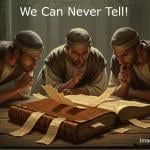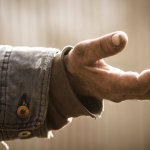Not long ago, The Atlantic published an article by Emma Green entitled “Democrats Have a Religion Problem,” consisting largely of an interview with Michael Wear, author of Reclaiming Hope and a former director of former President Obama’s faith-outreach initiative in 2012.
The Atlantic: Democrats have a religion problem
The article begins by pointing out that Democrats, once again, have proven themselves to be illiterate, ignorant, and clueless concerning religion and persons of faith, given President Trump’s garnering of 81% of the white, evangelical Christian vote in the November 2016 election. Wear not only describes his frustration as a conservative, evangelical Christian surrounded by folks who were not during his days working for Obama, but also offers a number of comments that are “interesting,” to say the least.

- Wear was surprised to discover that apparently not everyone is as thoroughly familiar with the various things Jesus is reported to have said in the gospels as Wear is. The title of one of his faith-outreach fact sheets was “Economic Fairness and the Least of These”; one of his colleagues, unaware of who or what “the least of these” are, thought it was a typo.
- In the never-ending battles between pro-life and pro-choice positions, Wear is convinced that it is the pro-choice folks in the Democratic party who, through their shrillness and inflexibility, are keeping pro-life people from considering voting for Democrats. “Some portion of voters would likely identify as both pro-life and Democrat, but from a party point of view, it’s basically impossible to be a pro-life Democrat . . . Reaching out to evangelicals doesn’t mean you have to become pro-life. It just means you have to not be so in love with how pro-choice you are, and so opposed to how pro-life we are.”
- One could read the entire article and conclude that the only real Christians in the United States are conservative Evangelicals—the rest who claim to be Christians are just posers. I was particularly struck by the following: “The Democratic Party is effectively broken up into three even thirds right now: religiously unaffiliated people, white Christians who are cultural Christians, and then people of color who are religious.”
This is very strange, since I find no slice of this Democratic pie that includes me—a white liberal who takes his Christian commitments very seriously. I’ve written frequently in this blog over the past four-plus years that I am a liberal because I am a Christian. The stereotype that liberal Christians are “cultural Christians,” that they don’t really believe in anything other than trendy and politically correct social causes, and that no liberal claiming to be a Christian could possibly be a real follower of Jesus, is not only wrong—it is patently absurd.
There are many problems lurking underneath Wear’s analysis, beginning with his assumption that party platforms have much of anything to do with how individuals vote. I have voted for the Democratic candidate in virtually every election I have participated in over the past forty years, not because I am a Democrat, but because the issues and commitments that are most important to me have most often been more closely represented by the Democratic candidate than any of her or his opponents. I vote as the person my experiences and commitments have made me into—those experiences and commitments have most often been shaped by my Christian faith.
With regard to Wear’s claim “it is virtually impossible to be a pro-life Democrat,” I simply observe that I have any number of friends and colleagues—many of them Catholic—who are both pro-life and vote regularly for Democratic candidates, simply because other issues they are equally committed to are best represented by those candidates. Whether these friends and colleagues are officially members of the Democratic, or any other, party is irrelevant. Broadening the scope a bit, I live in the most Catholic state, per capita, in the country. It also votes overwhelmingly Democrat both in national and state-level elections.
I first learned of the article in The Atlantic when a friend and colleague, who reads my blog regularly, forwarded a link to a New York Magazine article to me, suggesting that it might be of interest for my blog.
New York Magazine: The case for democratic outreach to religious liberals
The author of this article, Ed Kilgore, provides a link to and briefly critiques Green’s interview of Wear, then proceeds to blast the Democratic party for not paying attention to a demographic that should fall into its camp as easily as “low-hanging fruit”—liberal and progressive persons of faith. Although I do not appreciate being described as low-hanging fruit, I get the point. Assuming that “liberal, progressive persons of faith” is a demographic that can easily be described, it would make great sense for the more liberal of our two major political parties to do what it can to both understand and reach out to such persons.
But somehow, I don’t feel that I am part of a demographic, at least not of the sort that politicians, pundits, and pollsters tend to describe in sound bites and tweets. I don’t vote for liberal candidates because I am a Christian. I vote for liberal candidates because I am a liberal—and, as noted earlier, it is my faith commitment that, over time, has turned me into the liberal that I am.
It’s a subtle, but important, difference. Liberal persons of faith tend not to carry their faith on their sleeves, not because they are ashamed of their faith, but because their faith is not a list of dogmas, a collection of rules, or a checklist of required beliefs. A liberal Christian’s faith is on display in the life that she or he lives, the sort of evidence that is more convincing, but also more difficult to describe easily, than what one might hear on a stump speech or read in a policy platform.
A liberal and a Christian walk into a bar . . .
And discover that they are the same person.












